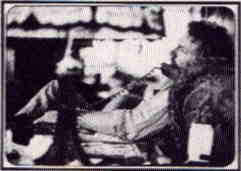 |
After "Sundown" Gordon Lightfoot makes up for lost time, by
Nancy Naglin
 "Carefree Highway" came form a road sign he saw outside of Flagstaff. Arizona. "I thought it would make a good title for a song. I wrote
it down, out it in my suitcase and it stayed there for eight months." The woman in the song is real girlfriend
he had when he was twenty-two. "Her name was Ann. I can still give you her last name but I'm not going to." It pleases him that nobody is ever going to know everything.
"Carefree Highway" came form a road sign he saw outside of Flagstaff. Arizona. "I thought it would make a good title for a song. I wrote
it down, out it in my suitcase and it stayed there for eight months." The woman in the song is real girlfriend
he had when he was twenty-two. "Her name was Ann. I can still give you her last name but I'm not going to." It pleases him that nobody is ever going to know everything.
He knows his popularity is growing "by leaps and bounds," but he doesn't know why his songs are successful. "Years went by and we didn't have any big hits. We weren't getting any air play. We had six albums out and we had a continual following of people who would come back again. I'm a fairly normal sort of person. I'm no
particularly smart and I'm not particularly stupid. Maybe it's the general normality of it, with a touch of art."
He has been chain smoking Kents all afternoon. Now the ashtray is overflowing with his perfectly uniform, beaten-to-death butts. Suddenly, bracelets jangling, he says "I just gotta go play a couple of licks." In the basement he plays
drums, surrounded by an avocado washer and dryer, a photograph-viewer and one of those over-sized, inflated
balloon bottles of Canadian whisky. "I'm just learning," he says ruefully. "I'm not good enough." Everything he does has to be perfect. Once he discovered a record company that was packaging his early out-takes. He bought thousands of the records and store them in his backyard. Every weekend he chopped up a carload with an axe.
"I'm in the process of refinement," is the only thing he'll say about what he's writing now. " I don't write too many protest songs any more. Everything I do is very subtle. I'm getting into love songs right now.
It's such an interesting area. It suggests such beautiful memories that it makes for a nice, gentler music picture."
Seventy percent of his new album is finished as we speak, but he's searching for the last three or four tunes. It has him fretting over cigarettes and wandering around the house until it's done. Rainy Day People is the working title (it would later be changed to Cold on the Shoulder), coming from a song which he thinks could be the best of his career. The album is more intricately orchestrated than
his others, with a continuation of that rich Sundown sound.
"At this stage of the game if I decided to put down my pen I wouldn't have to worry about it anymore, now would I?" Lightfoot isn't giving anything up. Like his father, he's running a business and he's in it for life. If, as he says. He will make up for a little lost time on the personal side, the first thing he will do is go out sailing. "But I'd have to study celestial navigation first. You just can't go out there and not know what you're doing. Then I'd
probably go downtown to a bar and have a few drinks and hang out with some of my buddies and friends and loved ones." He says "retire" the same way his father, who gave his life to a dry cleaning firm, would have said it. If he ever felt he couldn't write anymore, his idea of retirement would be to go and play twenty-five concerts a year.
"I could live on a mountain-side in Hawaii, or buy a sailboat and sail the Great Lakes." But it goes against his character. He's life other Canadian businessmen who worry about their credibility in the American market. He has to crank out those missing tunes for the new album. "I'm driven to do it. You gotta do it twice for them to really believe you."
On an earlier album there's a picture of Lightfoot in a suit singing at a microphone. He wears a white shirt with cuffs a full two inches out of the sleeves, and a shoe-string tie. Like a bank manager trainee, he is afraid lest he commit the worst of all Canadian faux pas - appearing untidy in public or otherwise creating a bad impression.
An hour before he is ready to leave for the airport, he discovers a pirated photo on a repackaged album cover showing him singing in a tee-shirt. "Pretty soon this is going to be public knowledge," he says angrily, showing the picture to his sister, his guitar player and his business manager. Dispose of the rose-petaled, embroidered work shirt, the rented jet, the turquoise jewelry and the
platin records, and it's the same earnest, earlier Lightfoot - the all-Canadian good guy with solid Ontario roots. If he is in many forms poetic, he is equally, paradoxically, prosaic as well.
End of article
|
 |
![]()